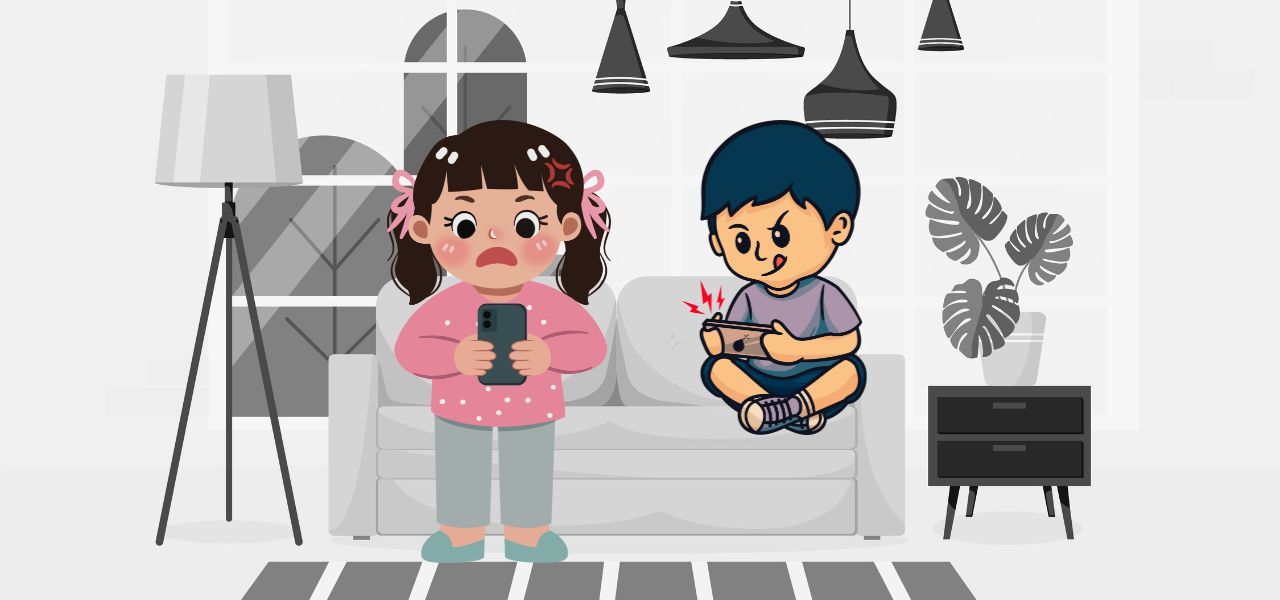By: Napol Riel
Online games are becoming more accessible in this day and age, thanks to Android phones. Everyone of all ages can freely play in this online digital world. Children are no exception. There are many benefits to this convenience, but there will also be negative consequences, such as sexual grooming. Through this article, I hope to share some personal experience and reflection on this issue.
According to UNICEF, playing games benefits children. This activity can help to improve thinking and decision-making skills, as well as provide a space for them to express themselves and enhance their competitive side. Online games allow players to connect in real time with other players in the game, also known as mabar (main bareng). Long-distance connections between players that begin with intense mabar are usually established on social media platforms such as Facebook, Discord, Instagram, and even WhatsApp.
All conveniences carry their own risks. The ease with which people connect through online games is not without its drawbacks, particularly among children. I overheard my elementary school niece’s mother giving talks to her daughter for secretly chatting with a stranger she met through an online game. My niece sent a vulgar photo in their chat, which her mother discovered. My niece is a typical child who enjoys telling stories and asking her mother questions. However, this is not the case.
Looking back on my adolescence in the early 2000s, online games were not as popular as they are today. Internet access was limited and costly. To play online games, I needed to find an internet cafe (warnet; warung internet) with computer specifications that were compatible. Even though I live in an urban area, there weren’t many internet cafes dedicated to online gaming.
Even when I found one, entering the internet cafe made me feel embarrassed and awkward. From the outside, it did not appear to be a suitable space for someone like me. And, sure enough, when I entered, it appeared that the people playing there were wealthy children. They concentrated on playing Ragnarok Online, with their ears covered by headsets in an air-conditioned room.
PlayStation 1 games were the most accessible video games to me at the time. I could play at my neighbor’s house or at the nearest PlayStation rental. Video games not only entertained me, but also taught me a lot, particularly English. Since there were few PS1 games that had been translated into Indonesian.
Children who have parents who support their development at home may be very fortunate, as was my niece, who was caught and then taught about digital literacy and the threats of grooming.
Online sexual-grooming
There are numerous hard news in the media about situations similar to my niece’s. It is clear that online games provide an open gate for perpetrators of crimes against children. The most common method is through sexual grooming.
Sexual grooming is a conditioning technique used by perpetrators to prepare children and their surroundings to commit sexual violence against them. Grooming can take place both online and in person. Online grooming of children varies, and perpetrators employ a variety of manipulation techniques, including deception, routine/intense contact, sexualization, kindness and flattery, etc.
Sexualization is the process by which a child’s sexuality (including sexual feelings, sensuality, and sexual behaviors) is “formed” in an inappropriate way for their developmental stage. Sexualization is the same as other forms of sexual violence that are frequently dismissed, such as cat-calling, sexist chats, sexist jokes, and providing a false understanding of children’s sensuality and sexuality. These sexualization practices encourage more severe sexual violence and its consequences.
As reported by the BBC yesterday (18/11), a pair of parents told them that their 16-year-old son committed suicide in 2023 after being subjected to sextortion. Sextortion is a type of sexual exploitation involving blackmail or coercion. A West African criminal gang deceived the victim (who was in the UK) by pretending to be a girl.
After conditioning is established, victims are usually duped into sending vulgar photos/videos by the perpetrator before being asked to send their own photos/videos in exchange. The victim is then threatened that the photos/videos will be distributed to family and friends unless they comply with the perpetrator’s demands; this pressure is thought to have led to the boy’s suicide.
So, what are the most likely steps adults can take to protect children from online sexual violence? Perhaps it could begin by providing a simple explanation of the importance of protecting personal data on social media; and introducing the various types of crime in the digital world.
My sister sets a screen-time limit for her daughter. She would occasionally play with her or simply ask her light questions about her enthusiasm for online games in order to rebuild communication and trust.
What about children who have no parents or caregivers at home? Or children with parents who have trouble accessing information? Some schools may have begun to teach children about digital literacy, encouraging them to use digital media wisely and creatively. But, outside of school hours, does it guarantee that they will be safe from online crime?
As an adult, I frequently forget that there may be many children around me waiting to be spoken to. Recognizing children’s vulnerability as small humans with limited experience and thought processes, I remember myself as a kid. Perhaps my childhood would be more meaningful if there were adult listeners to my adventures outside the home. I believe today’s children are the same. Or, do they crave it even more? Given that almost all of our daily activities now rely on the internet.
This realization prompted me to try to open up to the closest children; my nieces and nephews. Not as a “adult” but as a conversational partner. At least, that’s it for now. []
This article was translated by Napol Riel.
